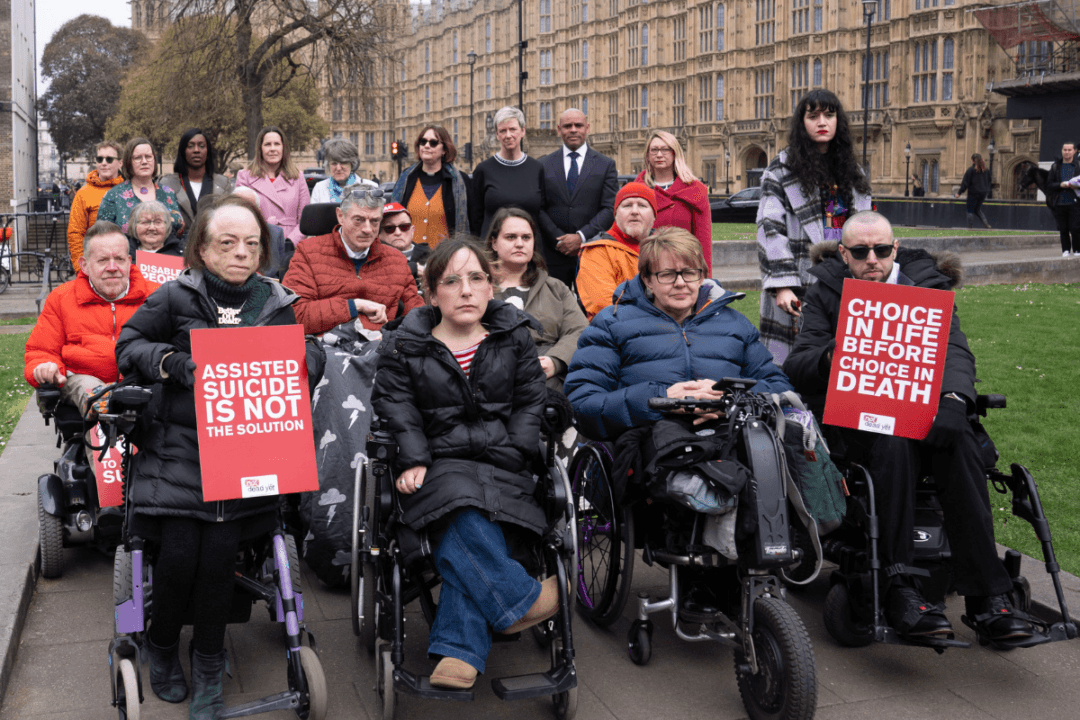Legalising assisted suicide would fundamentally change the doctor-patient relationship, a medical professional has warned.
“I think it would cause a huge, permanent rift in the trust between patients and doctors,” Dr. Calum Miller, a medical doctor and research fellow at the University of Oxford, told The Epoch Times.
Miller added that patients who are terminally ill may become frightened of their doctors, especially if they are also suffering with mental health difficulties.
He said that for patients who know that if doctors are legally allowed to end their lives, “you can easily see how people struggling with mental health difficulties would be terrified of telling their doctors.”
Changing Concept of Care
The medical doctor made the remarks as a committee of MPs began this week to wrap up the line-by-line scrutiny of the Terminally Ill Adults (End of Life) Bill, a Private Members’ Bill sponsored by Labour MP Kim Leadbeater.Danny Kruger said in his closing speech on the final day of the Committee Stage on Tuesday that this bill contradicts the NHS Act and the Hippocratic Oath.
Kruger said, “I think we should recognise that it is not health care that we are proposing to legalise.”
The Conservative MP for East Wiltshire said: “I think the foundations of health care in the West are contravened in this bill. The Hippocratic Oath contains the promise, ‘Neither will I administer a poison to anybody when asked to do so, nor will I suggest such a course.’
“This is the oath that doctors take and this has been the official ethical basis of medical practice in the West for millennia. But the current bill involves the final official abandonment of this ethical tradition.”
Miller likewise said that if the law is changed, it would be “hugely dangerous” as it would fundamentally change our concept of what constitutes “care.”
“It suggests that killing is a part of caring, and that is obviously a very dangerous thought,” he said.
Nowhere Safe
The committee was presented with dozens of amendments which were intended to improve safeguards, most of which were rejected, including one that would have prevented doctors from raising assisted suicide as an option unless it was mentioned by the patient first.Another amendment that was rejected would have made care homes and hospices assisted suicide-free zones, meaning places meant for the care of the elderly and terminally ill may be obliged to allow medically-facilitated dying on their premises.

“Care homes would not be exempt. It would be terrifying for family members knowing that if their loved one is in a care home, at any moment they could be put on a pathway towards this,” Miller said.
Conscientious Objection Protections ‘Effectively Meaningless’
Under the terms of the bill, there is a provision whereby if a doctor is unwilling or unable to engage in preliminary discussions with a patient who wants assisted suicide, they can opt out. However, they “must” refer the patient to another doctor they believe is willing and able to conduct that discussion.Miller said that because objecting doctors are obliged to refer their patient onto someone else, they are still forced to engage in the process in some degree, making conscientious objection protections in the bill “effectively meaningless.”
“There’s no protection for everyone else surround the procedure, including referral,” he said.
“We’ve seen the same with abortion, where doctors are protected from doing abortions, but they have to refer them,” Miller said.
A high-profile case from over a decade ago tested the scope for conscientious objection to the Abortion Act 1967.
Bill Implementation
Leadbeater has previously argued that her bill, which covers England and Wales, has “layers and layers of safeguards and protections,” including against coercion, and she believes it will probably be “the most robust piece of legislation in the world.”
The MP for Spen Valley asked Prime Minster Sir Keir Starmer on Wednesday whether he would agree that if the law is to change on assisted suicide, “it’s extremely important that it is implemented as soon as it is safe and practicable to do so?”
Starmer said that while the bill is a matter for the House of Commons, “it is the government’s role to ensure every piece of legislation that passes through Parliament is effective and workable.”
He said that the government will continue to work with Leadbeater, as the bill sponsor, as it would with every Private Members’ Bill that passes second reading.
“And if Parliament chooses to pass this bill, the government will implement it in a way that is safe and practicable,” the prime minister said.
The bill will return to the House of Commons for the Report Stage on April 25.







